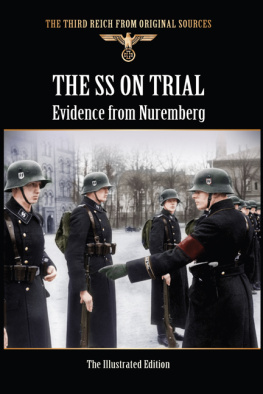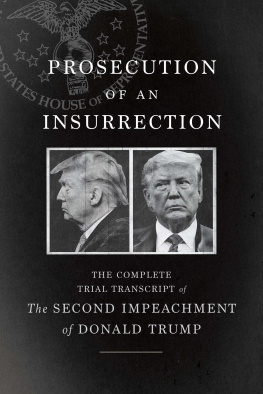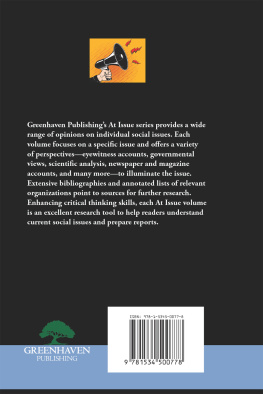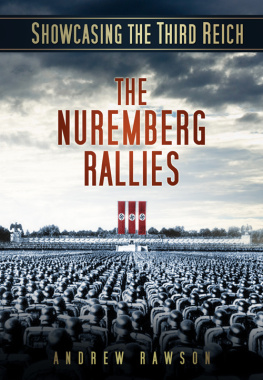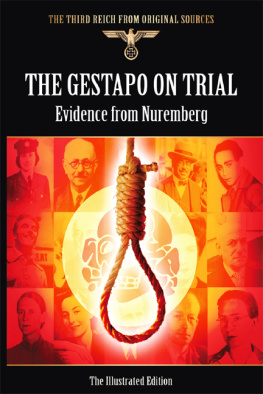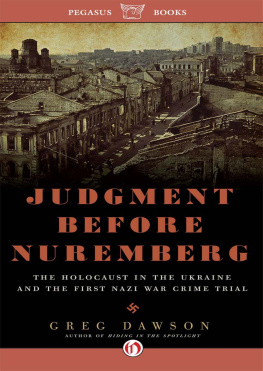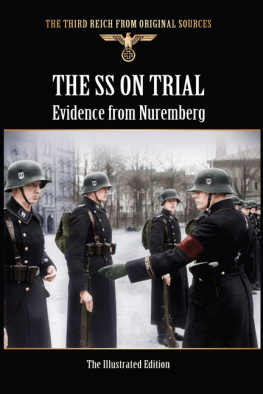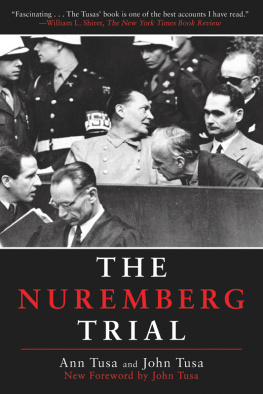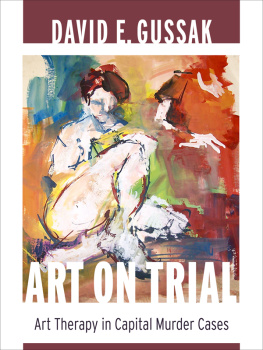
This edition published in 2014 by
Pen & Sword Military
An imprint of
Pen & Sword Books Ltd
47 Church Street
Barnsley
South Yorkshire
S70 2AS
First published in Great Britain in 2013 by Coda Books Ltd.
Copyright Coda Books Ltd.
Published under licence by Pen & Sword Books Ltd.
ISBN: 9781783463206
eISBN: 9781473849426
A CIP catalogue record for this book is available from the British Library
All rights reserved. No part of this book may be reproduced or transmitted in any form or by any means, electronic or mechanical including photocopying, recording or by any information storage and retrieval system, without permission from the Publisher in writing.
This book includes excerpts from The Trial of German Major War Criminals Proceedings of the International Military Tribunal Sitting at Nuremberg, Germany published under the authority of H.M. Attorney-General by His Majestys Stationery Office, London 1946/1947.
Printed and bound in England
By CPI Group (UK) Ltd, Croydon, CR0 4YY
Pen & Sword Books Ltd incorporates the imprints of Pen & Sword Aviation, Pen & Sword Family History, Pen & Sword Maritime, Pen & Sword Military, Pen & Sword Discovery, Pen & Sword Politics, Pen & Sword Atlas, Pen & Sword Archaeology, Wharncliffe Local History, Wharncliffe True Crime, Wharncliffe Transport, Pen & Sword Select, Pen & Sword Military Classics, Leo Cooper, The Praetorian Press, Claymore Press, Remember When, Seaforth Publishing and Frontline Publishing
For a complete list of Pen & Sword titles please contact
PEN & SWORD BOOKS LIMITED
47 Church Street, Barnsley, South Yorkshire, S70 2AS, England
E-mail: enquiries@pen-and-sword.co.uk
Website: www.pen-and-sword.co.uk
Contents
Foreword
T he Nuremberg Trials were held by the four victorious Allied forces in the Palace of Justice, Nuremberg from November 1945 to October 1946. Famous for prosecuting the major German war criminals, they also tried the various groups and organisations that were at the heart of Nazi Germany.
There were four counts against the accused:
- Count One: The Common Plan or Conspiracy
- Count Two: Crimes against Peace
- Count Three: War Crimes
- Count Four: Crimes against Humanity
The Rt. Hon. Sir Geoffrey Lawrence of Great Britain was the President of the court, and the United States of America, France, the United Kingdom, and the Union of Soviet Socialist Republics each provided one judge and an alternate, as well as a prosecutor and their assistants. Each defendant was given counsel, the majority of whom were German, along with a team of assistants, clerks and lawyers.
This volume is concerned with the trial of the SS and includes all testimony regarding this organisation. The defense counsel were as follows:
- Ludwig Babel, Counsel for the SS and SD to 18th March 1946, Counsel for the SS to 11th June 1946 and Co-counsel for the SS to 27 August 1946.
- Horst Pelckmann, Co-counsel for the SS from 2nd March 1946, and Counsel for the SS from 1st June 1946
- Dr Carl Haensel, Associate to Dr. H. Pelckmann from 1st April 1946
- Dr Hans Gawlik, Counsel for the SD from 18th March 1946
The witnesses called for the trial of the SS include among others, Friedrich Karl von Eberstein, Paul Hausser, Georg Konrad Morgen and Wolfram Sievers.
Friedrich Karl von Eberstein (1894-1979) was part of the German nobility, and an early member of the Nazi Party, the SA, and the SS. He rose to become a Reichstag delegate, an HSSPF (Higher SS and Police Leader) and SS-Oberabschnitt Fhrer (chief of the Munich Police). Eberstein testified about the organisation and history of the SS and SA, and their links with the German nobility. He was questioned that, in his role as chief of the Munich Police, how he did not know about the atrocities committed in Dachau concentration camp, only a few miles away, but he stated he had no authority over the camp commander.
Paul Hausser (1880-1972) was an officer in the German Army, achieving the high rank of Lieutenant-General in the inter-war Reichswehr. After retirement from the regular Army he became one of the most eminent leaders of the Waffen-SS, and fought in both the eastern and western fronts of World War II. During questioning, he vigorously defended the military role of the Waffen-SS and strongly denied that it was involved in any atrocities. After the war he sought to rehabilitate the reputation and legal status of the Waffen-SS.
Georg Konrad Morgen (1909-1982) was an SS judge drafted compulsorily into the General SS. In 1943 he was assigned a case of corruption in the concentration camp of Weimar-Buchenwald. His investigations over time became more extensive, and he discovered the policy of mass executions in the camps. Morgen went on to prosecute so many Nazi officers for individual violations that by April 1944, Himmler personally ordered him to restrain his cases. After the war, he continued in his legal career.
Wolfram Sievers (1905-1948) was the Reich manager of the Ahnenerbe (Ancestral Heritage Society) and was tried during the Doctors Trial where he was dubbed the Nazi Bluebeard. The experiments on humans had been conducted under the auspices of the Institute for Military Scientific Research, a part of the Ahnenerbe, and therefore the prosecution at Nuremberg laid the final responsibility for these barbaric acts on Sievers. He was hanged for crimes against humanity in June 1948.
Bob Carruthers
Statement of Criminality of Groups and Organisations
DIE SCHUTZSTAFFELN DER NATIONALSOZIALISTISCHEN DEUTSCHEN ARBEITERPARTEI (COMMONLY KNOWN AS THE SS) INCLUDING DER SICHERHEITSDIENST (COMMONLY KNOWN AS THE SD)
Die Schutzstaffeln der Nationalsozialistischen Deutschen Arbeiterpartei (commonly known as the SS) including Der Sicherheitsdienst (commonly known as the SD) and all offices, departments, services, agencies, branches, formations, organisations and groups of which it was at any time comprised or which were at any time integrated in it, including but not limited to, the Allgemeine SS, the Waffen SS, the SS Totenkopf Verbande, SS Polizei Regimente and Der Sicherheitsdienst des Reichsfuehrers-SS (commonly known as the SD).
The SS, originally established by Hitler in 1925 as an elite section of the SA to furnish a protective guard for the Fuehrer and Nazi Party leaders, became an independent formation of the Nazi Party in 1934 under the leadership of the Reichsfuehrer-SS, Heinrich Himmler. It was composed of voluntary members, selected in accordance with Nazi biological, racial and political theories, completely indoctrinated in Nazi ideology and pledged to uncompromising obedience to the Fuehrer. After the accession of the Nazi conspirators to power, it developed many departments, agencies, formations and branches and extended its influence and control over numerous fields of governmental and Party activity. Through Heinrich Himmler, as Reichsfuehrer-SS and Chief of the German Police, agencies and units of the SS and of the Reich were joined in operation to form a unified repressive police force. Der Sicherheitsdienst des Reichsfuehrers-SS (commonly known as the SD), a department of the SS, was developed into a vast espionage and counter-intelligence system which operated in conjunction with the Gestapo and criminal police in detecting, suppressing and eliminating tendencies, groups and individuals deemed hostile or potentially hostile to the Nazi Party, its leaders, principles and objectives, and eventually was combined with the Gestapo and criminal police in a single security police department, the Reich Main Security Office.

